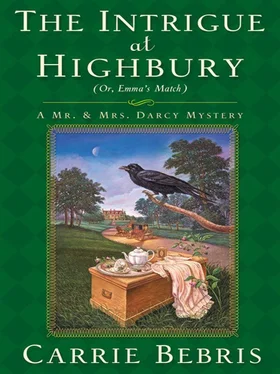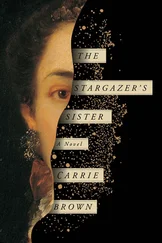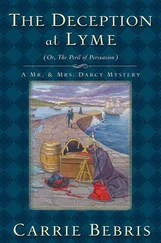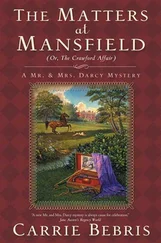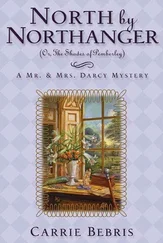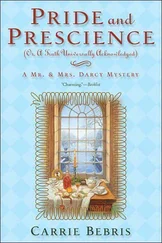“She mentioned that she had just found a note from Mr. Deal, and assumed he had left it at her door sometime before his arrest. But were that so, would she not have discovered it earlier? We encountered her in Broadway Lane this morning, and she had already been to the bakery and back to pack a basket for Mr. Deal. Surely she would have seen the letter lying there?”
Emma found it rather curious that Miss Bates should be sending anything to the peddler, as she suffered such straitened circumstances herself. But Miss Bates had a kind heart, and even in her own want shared what she could with those less fortunate.
“Miss Bates lives for letters. I cannot imagine that a note from anybody would have repeatedly escaped her notice.” The room was cold; Emma rose and stirred the fire. “Indeed, I am surprised she did not recite it verbatim when she spoke of it later. Or did she?”
“No, she said only that he thanked her for the tea he had shared with her and Mrs. Bates on Sunday.”
“Mr. Deal has been taking tea with the Bateses?” Even more curious. Was he on such familiar terms with other customers?
Emma sank back into her seat as the most extraordinary thought took hold. Was Mr. Deal wooing Miss Bates? Impossible! But… taking tea at her house… small little gifts… writing to her — a practice decidedly improper unless a couple were engaged. ..
Could it be? It would not be the first instance of a courtship having advanced right before her eyes without her realizing it. But — independent of his status as a murder suspect — he was entirely unsuitable! A peddler — an itinerant — raised by gypsies!
It was inconceivable that a respectable lady such as Miss Bates — a clergyman’s daughter, no less — could consider such a disreputable character. Even if he were cleared of the murder, even if his claims upon the Churchill name proved true, he had no claim upon the Churchill fortune. It belonged to Frank. Was Miss Bates — Mrs. Hiram Deal — to tramp across England with him, living out of his cart? The notion was absurd.
Still more absurd, however, was Mr. Deal’s interest in Miss Bates. With every scullery maid and farmer’s daughter in the village making eyes at the man, what attraction did a windy spinster hold for him? He could not possibly have fallen violently in love with her.
Did he prey upon her sentiments for some ulterior purpose?
Emma realized that she yet held the fire poker. She rose and replaced it, but did not sit back down.
“Mrs. Darcy, I am suddenly quite interested in that letter myself. Would you care to take a drive with me?”
“A little tea if you please, sir, by and bye…”
— Miss Bates, Emma
Mr. Knightley withdrew a notebook and pencil from his pocket. “I want a list of every person in Highbury to whom you sold any sort of remedy — a physic, tincture, ointment, infusion — anything purportedly medicinal.”
Mr. Deal regarded him incredulously. “I do not know the name of every single customer.”
“No, but you know some of them quite well — such as the maid Nellie, who spent half her wages buying philtres from you and who is now abed with belladonna poisoning.”
“Nellie? Poisoned!” Mr. Deal looked genuinely horrified. “Will she recover?”
“We believe so.”
“There are others to whom you have given particular attention,” Darcy said. “What is your design on Miss Bates?”
“Miss Bates? Why, nothing at all unseemly. I meant only kindness.”
“Nothing unseemly?” Mr. Knightley said. “Everything perfectly proper? Such as corresponding with her — an unmarried lady?”
“We are not corresponding.”
“Miss Bates told me this morning that she had received a letter from you,” Darcy said.
“What are you talking about? I wrote no letter to Miss Bates.”
“You did not leave her a note thanking her for the tea you took together on Sunday?”
“No, though perhaps I ought to have. But it was only Wednesday — yesterday — that we had tea and”—he gestured at his surroundings—“I have been a little occupied.”
Darcy noted Deal’s memory for dates, which coincided with Miss Bates’s account. The letter’s author had erred; Mr. Deal had not. Who, then, had written the letter? And to what purpose? Why would anybody trouble himself to forge a thank-you note?
Unless it was not a thank-you note.
Someone in the village had sent three letters to Hartfield with hidden meanings. Though Mrs. Elton had admitted to writing the first, he could not credit her with the others. Had Miss Bates’s note been authored by the writer of the latter two? Was it not a simple thank-you, but another word puzzle?
Darcy drew Mr. Knightley aside. In a low voice, he shared his conjecture. Mr. Deal watched them with open interest, making no attempt to pretend he was not trying to hear their conversation.
“We need to see that note,” Darcy finished.
“We will call upon her tomorrow as early as possible.”
“I think you should go now,” Mr. Deal said.
The peddler’s impertinence took Darcy aback. “I do not recall our having solicited your opinion.”
“I give it to you freely.” He leaned towards them on the rickety chair. “Gentlemen, someone has murdered my father, attempted to kill my cousin, and poisoned an innocent young girl. Now a fraudulent letter bearing my name has appeared at the home of one of the few people in Highbury who has extended friendship — honest, disinterested friendship — towards me. This letter concerns you enough that you suspended your interrogation of me to discuss it between yourselves. I have told you that I am not the criminal you seek, told you in so many ways that I do not think there is another manner of expressing it. Yet you waste your time here with me while Miss Bates might even now be in danger. I beg you — set off without delay for Broadway Lane to examine the note and ensure that good lady’s safety. If you insist on continuing this interview, we can do so another time.” He motioned towards the stone walls with a defeated shrug. “I am not going anywhere.”
Mr. Knightley turned to Darcy and nodded. “He speaks sense. We can finish this tomorrow, after we have determined more about the letter and taken steps to protect Miss Bates, if necessary.”
Much as Darcy hesitated to trust the peddler, any threat he posed was contained by prison bars — while if the poisoner yet roamed free, Miss Bates was not the only person at risk. “Let us go directly.”
Mr. Knightley approached the door to signal the guard. Mr. Deal rose.
“Mr. Knightley—”
He turned back to the peddler. “Yes?”
“I do not suppose, sir, that you would contemplate taking me with you?”
At the magistrate’s startled gasp, Mr. Deal held up his palm. “Pray, do not dismiss the idea yet. Only consider — I might be able to help. That letter allegedly came from me; it was almost certainly written by someone familiar with my movements. If I were to examine it, I might find something in it that you cannot.”
Mr. Deal also might use the opportunity to lead their investigation further astray. Or to escape. Or worse. “We can bring the letter back with us if we believe his perspective would prove useful,” Darcy said to Mr. Knightley.
“How many trips to Guildford do you want to make?” Mr. Deal responded. “At the expense of valuable time?”
“Is it not rather late to be calling upon the Bates ladies unanticipated?” Elizabeth asked as she and Mrs. Knightley negotiated the dark staircase that led to the apartment. She was anxious herself to see Mr. Deal’s letter, cherishing faint hope that it might somehow illuminate larger questions about the peddler, but she did not want to incommode or intrude upon the older women.
Читать дальше
